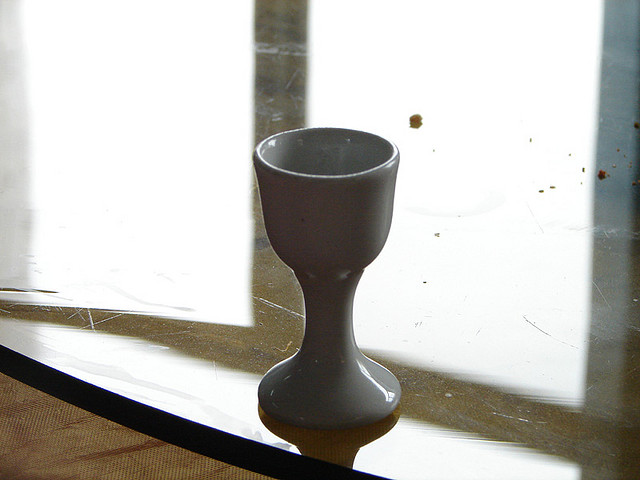 During a recent reporting trip to central China, I went to a banquet honoring a group of visiting foreign scientists. I’d heard about these banquets: red tablecloths, elaborate dinnerware, a procession of courses long enough to turn eating into an athletic event. But what were these miniature wineglasses, filled so deftly with clear liquid? The woman next to me, an American energy expert with long experience in China, looked at the sparkling glasses with a mixture of amusement, disgust, and resignation. “Baijiu,” she sighed. “They never forget the baijiu.”
During a recent reporting trip to central China, I went to a banquet honoring a group of visiting foreign scientists. I’d heard about these banquets: red tablecloths, elaborate dinnerware, a procession of courses long enough to turn eating into an athletic event. But what were these miniature wineglasses, filled so deftly with clear liquid? The woman next to me, an American energy expert with long experience in China, looked at the sparkling glasses with a mixture of amusement, disgust, and resignation. “Baijiu,” she sighed. “They never forget the baijiu.”
Baijiu, usually distilled from sorghum, has been part of Chinese life for hundreds if not thousands of years. The reaction of the first laowai to taste it is lost to history, but for well over a century foreigners have described baijiu with escalating horror. “One can hardly imagine what pleasure the Chinese find in imbibing these burning drinks, which are absolutely like liquid fire, and, moreover, very ill tasted,” the French Catholic missionary Évariste Régis Huc wrote in 1854. Dan Rather, reporting on Nixon’s visit to China in 1972, described Maotai, a famous variety of baijiu, as “liquid razor blades.” Others go further: “Socks with AIDS.” “Pure distilled evil in liquid form.”
In a bid for cross-cultural understanding, Derek Sandhaus, an American living in Chengdu, is trying to acquire a taste for baijiu by heroically consuming 300 shots (results are pending). Tom Scocca, on the other hand, goes straight for baijiu-hating gold in Beijing Welcomes You, his very funny chronicle of the preparations for the 2004 Olympics:
The flavor of baijiu might have been the single most insurmountable thing to the foreign palate in all of China … it began with a nose-filling, cloying floral aroma like that of fabric softener, then washed through the mouth like smoky kerosene, leaving in its trail the stinging, acrid taste of the vomit after a vodka binge.
At my first banquet, I was innocent of all this. So when our host strolled by to toast us with his cup of baijiu, I followed the lead of the rest of my table, obediently raising and downing my doll-sized glass. What … ?! Confused, profane thoughts filled my jet-lagged brain. Had I mistaken a Sterno can for a drink?
My companion looked at me sympathetically, and shrugged.
Baijiu brands range from top to bottom shelf, and come in many varieties including “heavy fragrance,” “light fragrance,” and “sauce fragrance.” (Wikipedia politely describes sauce fragrance baijiu as being “quite challenging” to the Western palate and distinguished by its “solvent and barnyard aromas, with the former, in combination with the ethanol in the liquor, imparting a sharp ammonia-like note.”)
Among the business and government classes, baijiu is social fuel, used not just to loosen up a banquet crowd but to cement relationships and prove one’s mettle in China’s male-dominated power networks. Refusing any one of the dozens of toasts during a typical banquet is considered an insult or a sign of weakness — and definitely bad business.
The result is that China is the only country where binge drinking increases with age. (And while men are far more likely to be binge drinkers than women, women aren’t immune.) Baijiu ranges from 40 to 60 percent alcohol by volume — 80 to 120 proof — so even a few of those tiny glasses can have a powerful effect. Several government officials have died of alcohol poisoning after banquets, and every expat seems to have a story about an acquaintance, foreign or Chinese, who was rushed to the hospital after joining one too many toasts.
While foreigners are more voluble about their hatred of baijiu, I didn’t meet any Chinese who truly liked it, either, though plenty upheld their social obligation to drink it. The younger Chinese I met seemed to regard the baijiu bender as a quaint old man’s game, something like the three-martini lunch. Perhaps the tradition will fade with time.
As for me, a female, frizzy-haired, non-Chinese-speaking journalist, I knew I wasn’t going to fit into the banquet crowd, no matter how many liquid razor blades I drank. Baijiu or no baijiu, I wouldn’t prove myself to be anything but the obvious: a curious outsider. So I navigated my remaining banquets by repeatedly raising the same brimming glass, feeling only a buzz of gratitude — and 120-proof relief. Gan bei!
Baijiu cup photo courtesy of Flickr user Helga’s Lobster Stew.
Michelle, thank you for your interesting article. I found it from The Daily Dish and linked to it on my site. I also expanded on my experience with baijiu as an expat here in China and why I think it is something that shouldn’t be feared but should be appreciated. Anyway, glad to hear your experience.
http://prcand.me/2012/9/4/they-never-forget-the-baijiu
Thank you, Matthew! Great survival tips.
I can still taste the last glass of Moutai I drank, over ten years ago. Even so, I hope that I taste it again, because that will mean that I’m in a convivial group in China that has just finished a great meal and is getting ready to laugh a lot, and probably sing a few songs and do a little dancing. Lao Zhang, I miss you!